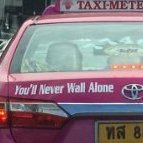The Battle Between Populism And Privilege In Thailand
-
Recently Browsing 0 members
- No registered users viewing this page.
-
Topics
-
-
Popular Contributors
-
-
Latest posts...
-
23
Crime Canadian Man Caught Smuggling Heroin Hidden in Women’s Handbags at Airport
Off topic troll post removed @blazes -
55
Is it actually possible for a foreigner to buy land and run a tourism business in Thailand
Of course its a wind up. Who in their right mind submits his business plan to a Asian chat forum? Its pretty obvious who it is as as the style becomes more clear with each post. The OP is beginning to have trouble keeping his story straight. -
3
Who here is in Thailand on a Non-B visa and what job/situation helped you get it?
I had Non-B visa (with Work Permit) for over 10 years, I moved to marriage Non-O a few years ago. I had the Non-B through my Thai company that I setup and run. In my country (NZ) I was only ever able to get 3 months, but in Australia, they regularly gave me 1 year, multi-entry Non-B. Extending at immigration was always a pain in the ass, without an agent they just make up any nonsense to not give it to you, because they want the bribe from the agent. For several years, I left the country every 90days, taking short holidays, rather than go through the hassle of extending at immigration in Bangkok. Then each year I would get a new 1 year, multi-entry Non-B back in Australia. When covid hit, I had no choice but to use an agent, which cost me about 47k THB. Bare in mind I run a legitimate, tax paying business, with Thai staff, and hold a work permit. Then I got married, now I do everything myself, it's much easier, less documents, no ways from them to make stuff up or change requirements on the spot. -
23
Crime Canadian Man Caught Smuggling Heroin Hidden in Women’s Handbags at Airport
Customs or ONCB must have been tipped off, hence the photos of him checking in ... taking bag to the oversize scanner ... all part of the evidentiary trail showing that it was his bag and he checked it in, when he would have been asked 'did you pack it yourself / are you carrying anything for anyone else', to which he would have answered 'no'. So can't argue "someone must have put it in my bag after I checked it in" ... -
48
Brown out Samui
I know, but the problem is not the transformer from high voltage to low voltage, the problem is a broken low voltage cable/line. In my case salty corrosion in a connection on the line by the beachfront. -
0
The Commies /Socialist run but can’t hide in Sanctuary Cities…
America First and Supporters of the Republic will find you one way or another! We demand adherence to the law. Federal law supersedes local law. New USAtty in LA comin to enforce the law! The story is based on a US ATTY lawsuit comment on X
-
-
Popular in The Pub






.thumb.jpeg.d2d19a66404642fd9ff62d6262fd153e.jpeg)







Recommended Posts
Create an account or sign in to comment
You need to be a member in order to leave a comment
Create an account
Sign up for a new account in our community. It's easy!
Register a new accountSign in
Already have an account? Sign in here.
Sign In Now